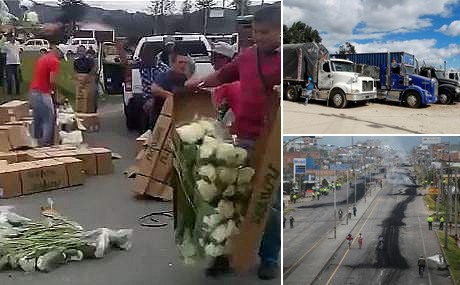Strike

Click here to see a video of how the flower cargo is being destroyed (photo on the left). More images of the strike on Reuters.com (photos on the right).
Flower exports
The flower growers are affected by the strikes as most of the shipments of their flowers are delayed and some are even destroyed. "Our truck drivers are being stopped and blocked when they come across an area where the strike is going on," says Maria. "And even worse, we have seen videos where flowers are being pulled out of the truck and destroyed." And not only the large trucks that carry cargo are being stopped. "One of the smaller cars got stopped 2 days ago and they told him to leave for that time and if he tries to get flowers through again, they will burn it", says Maria.
Fortunately, it has not happened to the shipments of Jordan Farms yet, but they are affected. "Our truck drivers have to find dirt roads to avoid the strikes every day. Therefore, the shipments to the airport are taking longer than usual and some of the flowers missed the connection with the airlines. Therefore, they decided to start delivering the flowers earlier."
High costs
According to Maria, it is a serious problem and increases the costs of many growers. And not only is it affecting the flower sector, but the entire agricultural and commerce sector. Colombia has about 330,000 trucks moving imports and exports to and from the Andean country's ports on the Caribbean Sea and Pacific Ocean. On July 6, the Telesurtv.net reported that the strike resulted in up to 246 million USD in losses.
Taking action
According to Colombiareports.com, the government has now ordered the military to take action. "The government has so far been unable or unwilling to appease the strikers. Amid the escalation of the strikes, the prosecutor General ordered the arrest of strike leaders and President Juan Manuel Santos ordered the military to deploy as many as 13,000 soldiers to free up the roads, increasing fears the strikes could turn violent."










